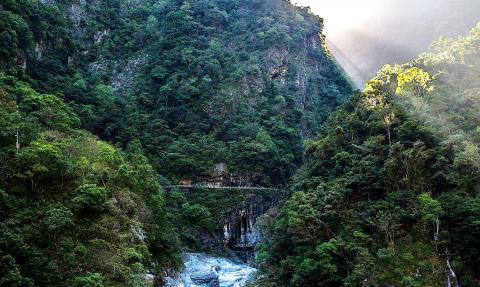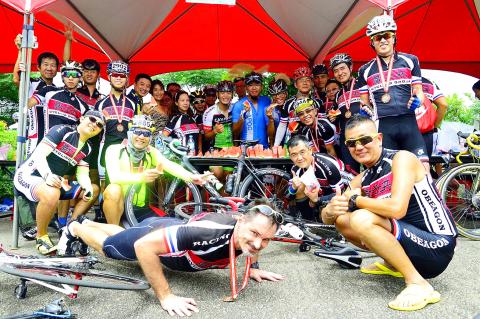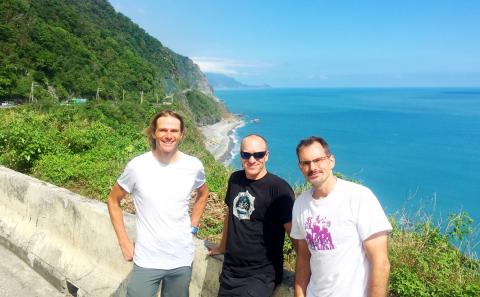What happens when your trustworthy training route becomes mundane? Most of us will just keep slogging through it for decades, losing that former feeling of motivation. Most people will just stay within their comfort zone, unsuccessfully searching to breakout of this death-spiral. What if there were a prescription to cure the banal, or what I call the “Suffermechanism?”
Professional counselors recommend breaking out of that same boring routine. For the ‘A-type’ personality, a dynamic change is sometimes what’s needed. I found my cure cycling Taiwan.
Scott revitalizes that old spirit

Photo courtesy of Taiwan Cyclist Federation
Five years ago I began browsing through magazines, books and blogs, hoping to revitalize that old spirit. I ran into Lee Rodgers at a cycling industry trade show in October of 2014. Lee, the international marketing manager for the Taiwan King of the Mountain (KOM) Challenge, told me about the event and I became intrigued.
The Taiwan KOM Challenge is an annual race that sees cyclists from all over the world scale some of Taiwan’s toughest peaks. The cyclists set off from Cisingtan (七星潭) in Hualien County, and travel 105km to Wuling (武嶺) on Hehuanshan (合歡山) in Nantou City.
After thinking it over back in my hotel room, I decided to throw down the gauntlet and join the event.

Photo courtesy of OBG Cycling Club
The first 18km is a neutral start and feels like just another race. That mundane feeling is still present. However, as the race peloton turns left off Hualien County’s Taroko Gorge Bridge, a warm fuzzy feeling fills me from my head down to my cleats. It dawns on me that this race is going to be the most epic experience of my life. It was not until we enter the actual gorge, cycling under the overhangs, taking in the amazing scenery, crossing bridges, looking down at the river below, listening to the sounds of nature, viewing the signs that mark the changes in elevation that it suddenly hits me — we are all going to ride to an elevation of 3,270m above ground level, into and above the clouds.
When I cross the finish line and receive my finisher’s medal, I am greeted with applause from strangers, race staff and other riders. Then someone hands me a small cup of hot ginger tea. There was the cure in front of me.
I keep returning to Taiwan each year to participate in the Taiwan KOM Challenge, which this year starts on Oct. 20.

Photo courtesy of Scott Ellinger
Brett will return
Last year, I came to Taiwan for a third time to participate in the Taiwan KOM Challenge. I met Scott who tells me that he first discovered the country in 1988 while studying Chinese. On a trip in his car from Taipei to Hualien, the US expat told me stories about Taiwanese cycling culture from the perspective of a localized foreigner, who is well known on the Taiwan cycling circuit and seems to know the nation’s every cycling route.
During our car ride, he explained the most striking part of Taiwanese cycling: that clubs are welcoming and accepting of just about anyone.
I’ve discovered this myself. Taiwanese are always there to assist in time of need whether it be roadside motivation during a race, giving you an extra energy gel packet or top up of water, help changing a flat tire or just stopping to take a photo with you. The fellowship is unmatched anywhere else. There will always be someone to put a smile on your face and give you support whether during a race or just on a normal ride.
Will I return for a fourth time to the Taiwan KOM Challenge? Almost certainly.
It was only after my third time that I really understood: the people of Taiwan, the breath-taking beauty of the island, the ethos of the cycling community, the unique friendliness of Taiwanese cyclists and most of all, the beef noodle soup.
Cycling in Taiwan is not only magnificent but also addictive for anyone who discovers it.
Complete details of the Taiwan KOM Challenge can be found at the English and Chinese-language Web site: www.taiwankom.org.

Growing up in a rural, religious community in western Canada, Kyle McCarthy loved hockey, but once he came out at 19, he quit, convinced being openly gay and an active player was untenable. So the 32-year-old says he is “very surprised” by the runaway success of Heated Rivalry, a Canadian-made series about the romance between two closeted gay players in a sport that has historically made gay men feel unwelcome. Ben Baby, the 43-year-old commissioner of the Toronto Gay Hockey Association (TGHA), calls the success of the show — which has catapulted its young lead actors to stardom -- “shocking,” and says

The 2018 nine-in-one local elections were a wild ride that no one saw coming. Entering that year, the Chinese Nationalist Party (KMT) was demoralized and in disarray — and fearing an existential crisis. By the end of the year, the party was riding high and swept most of the country in a landslide, including toppling the Democratic Progressive Party (DPP) in their Kaohsiung stronghold. Could something like that happen again on the DPP side in this year’s nine-in-one elections? The short answer is not exactly; the conditions were very specific. However, it does illustrate how swiftly every assumption early in an

Inside an ordinary-looking townhouse on a narrow road in central Kaohsiung, Tsai A-li (蔡阿李) raised her three children alone for 15 years. As far as the children knew, their father was away working in the US. They were kept in the dark for as long as possible by their mother, for the truth was perhaps too sad and unjust for their young minds to bear. The family home of White Terror victim Ko Chi-hua (柯旗化) is now open to the public. Admission is free and it is just a short walk from the Kaohsiung train station. Walk two blocks south along Jhongshan

Francis William White, an Englishman who late in the 1860s served as Commissioner of the Imperial Customs Service in Tainan, published the tale of a jaunt he took one winter in 1868: A visit to the interior of south Formosa (1870). White’s journey took him into the mountains, where he mused on the difficult terrain and the ease with which his little group could be ambushed in the crags and dense vegetation. At one point he stays at the house of a local near a stream on the border of indigenous territory: “Their matchlocks, which were kept in excellent order,